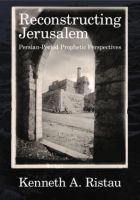Reconstructing Jerusalem
Persian-Period Prophetic Perspectives
Kenneth A. Ristau
“Ristau’s generative discussion suggests that the reception of these texts and their effect on the later growth of the city could be a constructive direction for further research. Works of prophetic literature emerge from their historical contexts but nonetheless do not remain yoked to them. As Ristau’s stimulating research indicates, prophetic literature has the capacity to transform not just the world as it is but also the imagined limits of what it can be.”
- Description
- Reviews
- Table of Contents
“Ristau’s generative discussion suggests that the reception of these texts and their effect on the later growth of the city could be a constructive direction for further research. Works of prophetic literature emerge from their historical contexts but nonetheless do not remain yoked to them. As Ristau’s stimulating research indicates, prophetic literature has the capacity to transform not just the world as it is but also the imagined limits of what it can be.”
“While the restoration of the temple is often viewed as the return of divine favor to God’s people, Ristau successfully demonstrates that for the post-exilic prophets . . . this is only true inasmuch as it reestablishes Jerusalem as the city of Yahweh’s habitation and the locus of the Davidic house. Due to its extensive use of untransliterated and untranslated Hebrew—and the occasional untranslated German—this important volume would be most useful for graduate students or scholars interested in Persian Yehud.”
Abbreviations
Acknowledgments
Introduction
Reconstructing Jerusalem: Outline, Method, Scope
The Rise and Fall of State Ideology in Judah
Problems in Post-collapse Judean Society
"No Houses Had Been Built": The Archaeology of Persian-Period Jerusalem
The Settlement
Fortifications
Epigraphic Evidence
Burial Site and Significant Material Remains
Interpretations and Regional Context
Recreating Jerusalem: The Isaianic Perspective(s)
Reconstruction in Deutero-Isaiah
Reconstruction in Trito-Isaiah
Conclusions
Revitalizing Jerusalem: The Perspective of Haggai
The Date and Organization of the Work
The Temporal Frame and Sitz-im-Leben
The Nature of the Restoration
Reconstruction as a Covenant Imperative
The Temple as Bourse
Zerubbabel as Hoffnungsträger for the Temple's Reconstruction
Conclusions
Reconsecrating Jerusalem: The Perspective of Zechariah 1–8
The Composition of the Text
The Temple and the Community in the Divine Combat Cycle
Conclusions
Reforming Jerusalem: Synchronic and Diachronic Perspectives from Zechariah 9–14 and Malachi
The Explicit and Implied Imperial and Regional Context(s)
Persians and Edomites in Malachi
Judean Leadership and the Community
The Status of the City and the Temple
Conclusions
Conclusion: From Cult to Culture
The Two Dimensions
Conclusion
Bibliography
Index of Authors
Index of Scripture
Mailing List
Subscribe to our mailing list and be notified about new titles, journals and catalogs.




